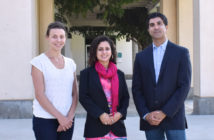Dean of the School of Education draws on evidence to propose policy
As an athlete, father, scholar, and educator, Naslund Endowed Dean of the University of Redlands School of Education Andrew Wall sees the often-unrealized potential of sports and fitness in educational settings.
A former top-five national cyclist who still rides his bike almost daily and participates in a cross-country ski marathon annually, Wall is passionate about the benefits of working out for his own productivity. But it’s not just personal. He points to a body of research on learning that shows that students reap benefits from physical activity—not only in terms of health, but also in terms of intellectual and social development.
“We know that the people who engage in physical activity are better equipped to intake and recall information because of the chemical changes in the brain,” he says. “We could make some really meaningful shifts in educational policy as it relates to health.”
In elementary schools, recess is one of these areas. While recently schools have moved toward more instructional and less recess time, Wall notes studies tell us students would benefit from a trend in the opposite direction. “Kids are in fact better served by running around periodically throughout the day,” he states. “In that case, students actually experience learning gains.”
At the high school level, Wall points out by the end of the ninth grade, 85 percent of students are out of athletics all together. More opportunities for sports participation could help students thrive. For example, in some states, high schools support not just varsity-level teams, but separate groups for every
grade level.
Wall cautions that athletic involvement by itself does not guarantee a positive outcome. Leadership is essential. In his own study of sports and levels of substance abuse, Wall and his colleagues found team norms have a powerful impact. The findings showed if a coach had a permissive attitude, then students would drink quite freely; if coaches were highly restrictive, then athletes would follow that advice, at least during the athletic season.
“Team sports are powerful spaces for good and bad, just like other teaching settings,” Wall says. “If kids are engaged in positive team-building enterprises, those can create life skills—motivation, planning, and conflict resolution. At the U of R, we are lucky to have coaches who are, from my experience, thoughtful, sophisticated, and endowed with an understanding of teamwork.”



